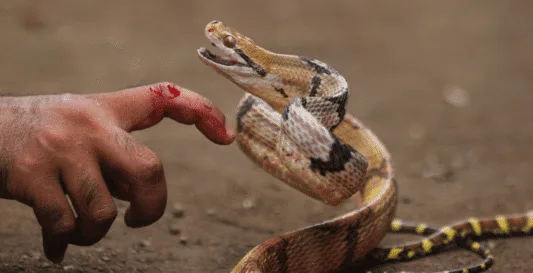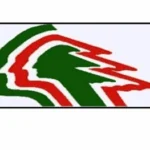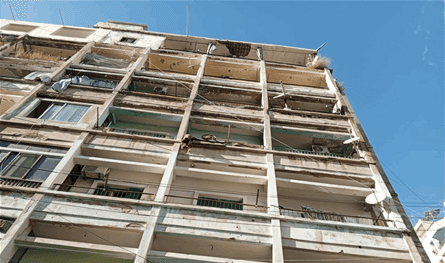
Poisonous snake bites in Lebanon, treatments are missing…
With the approaching summer heat and rising temperatures, venomous snakes are once again active in the Lebanese regions, especially rural and mountainous areas, raising the level of danger to the population and bringing back to the forefront the crisis of the absence of anti-venom medications in government and some private hospitals. Are we facing a recurring seasonal health disaster?
Why do snakebites increase in summer in Lebanon?
It is known ecologically that snakes emerge from their hibernation at the beginning of spring, but their peak activity occurs during the months of June and July, when temperatures rise and mountainous and rugged areas become more attractive to them. A number of cases are recorded annually, especially in the villages of the south, the Bekaa, and the north, where forests and uninhabited areas abound.
Although some bites are not fatal, delay in appropriate treatment can lead to serious complications that may kill the injured person.
What are the most common poisonous snakes in Lebanon?
Lebanon is characterized by great biological diversity, and includes more than 25 species of snakes, including 3 poisonous species that are considered the most dangerous to human life:
1. Levantine snake (Vipera palaestinae)
- Most common Among the poisonous snakes in Lebanon.
- It lives in mountainous and coastal areas.
- Distinguished With a triangular head and dark patterns on the body.
- Poison It causes local swelling and systemic symptoms such as low blood pressure and difficulty breathing.
2. Black squirrel (Atractaspis engaddensis)
- A small snake, but highly venomous.
- It lives in hot and dry areas.
- They secrete a neurotoxin It affects the heart muscle and lungs.
3. Arabian cobra (Walterinnesia aegyptia)
- It is less widespread than others, but it is present in some areas of the south and the Bekaa.
- Its venom is neurological and very dangerous, and may lead to paralysis and death if not treated immediately.
Note: Most snakes in Lebanon Non-toxicHowever, it is difficult for the average person to distinguish between them and poisonous species, so it is advised not to approach any snake.
Symptoms of poisonous snake bites: When does the condition become serious?
Symptoms depend on the type of snake, the amount of venom injected, and the location of the bite. But the most common general symptoms include:
- Severe pain At the site of the bite, it is accompanied by redness and swelling.
- Nausea and vomiting Dizziness.
- General weakness And pale.
- difficulty breathingEspecially in cases of cobra or serpentine bites.
- Tingling or numbness fringe.
- bleeding Localized or from body openings (rare).
If these symptoms appear after being bitten, you should immediately go to the nearest hospital or contact the Lebanese Red Cross.
First aid after a sting: Steps that may save a life
In the event of a snake bite, the following steps are necessary until reaching the hospital:
- Contact the Red Cross immediately Call 140 or the nearest ambulance.
- Calm the injured person Avoid movement as much as possible.
- Immobilizing the affected limb Below the level of the heart to reduce the spread of poison.
- Remove jewelry or tight clothing From the affected party.
- Do not try to suck the poison Or cut the wound, as this may increase the spread.
- Do not give the injured person drinks or food Until reaching the hospital.
The most dangerous crisis: Where is the antitoxin?
Despite the danger of snake bites, medical and pharmaceutical reports indicate Anti-venom injections are rare In most hospitals in Lebanon, especially government ones. The reason for this is due to:
- High cost of injection Which may amount to hundreds of dollars.
- Short shelf life It does not exceed two years, which makes it susceptible to damage if not used during the bite season.
- The country’s import of these species is weak Of medicines since the economic crisis.
According to sources in the health sector, some patients have been forced over the past years to… Asylum to Syria To get the injection, putting their lives at risk due to the delay.
Why does the state not provide a permanent stock of antivenoms?
Some hospital administrations attribute this to a lack of budget and the difficulty of predicting the number of sting cases annually. In the absence of support from the Ministry of Health, private institutions prefer to avoid purchasing these injections, which may be wasted if not used during their season.
This reality puts citizens, especially in remote villages, under constant threat, and confirms that Public health in Lebanon has become a hostage of crises And not just toxins!
What is needed to avoid a health disaster?
- National awareness campaign Through the media about safe handling of snakes.
- Supporting peripheral hospitals By the Ministry of Health with sufficient stock of antivenom.
- Training health personnel On first aid for cases of poisoning.
- Coordination with global health organizations To provide injections at subsidized prices.
Tips to avoid poisonous snake bites in the summer:
- Do not walk in dense grassy areas or rocks without closed shoes.
- Avoid sitting or sleeping outdoors at night.
- Do not move large stones or firewood with bare hands.
- If you see a snake, do not try to kill it or approach it, but leave the place immediately.
- Keep your Red Cross number handy.
With every summer, a case returns Venomous snake bites To raise a big question about the extent of the Lebanese health system’s preparedness in the face of natural disasters. Between the absence of medicines and the weakness in awareness, the citizen remains alone in the field, suffering between poison and helplessness.
Lebanon today

















